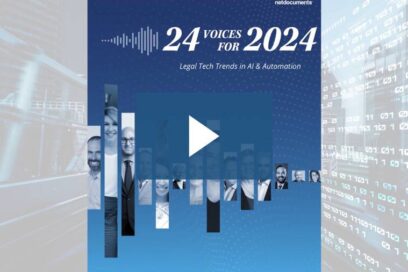Generative artificial intelligence in the legal industry isn’t an if — it’s a now. Legal professionals are already using it, and nearly two-thirds expect generative AI to be a major factor going forward, according to the International Legal Technology Association’s 2023 Technology Survey. That’s a three-fold increase from 2022. In fact, 73% of legal professionals intend to incorporate artificial intelligence into their work within 12 months, a Wolters Kluwer report indicates.
As specialists in helping legal professionals do their very best work and leverage AI tech responsibly, we know that AI is here to stay. It will continue to evolve and improve, and it’s already starting to revolutionize the workload for law firms and legal departments. AI soon will alter the legal business model, including legal services, how individuals work, professional development and almost every other aspect.
36% of lawyers believe AI tools will be mainstream within the next five years.
Organizations that have already adopted generative AI know its power and its possibilities. Mike Haven, Intel’s head of legal operations, believes we’re at a crucial tipping point for technology adoption.
“[S]tudies show that companies and firms with greater exposure to AI or generative AI following the release of ChatGPT are making substantially more money than those with less exposure,” Haven says, asserting that a top-down approach and process rigor are key to accelerating adoption.
Using those factors to take advantage of this tipping point can help position law firms to thrive. PwC research indicates that businesses can use AI to save up to 40% of the time spent manually inputting, mining and extracting information from documents. And a Harvard Business School study found that AI significantly increased performance and quality for every model specification handled by knowledge workers.
How will AI be used?
Productivity, consistency and effectiveness are perhaps the greatest gains from generative AI, as the technology’s speed handles time-consuming administrative and legal tasks, letting legal teams focus on more robust creative and critical thinking for legal strategies. Lawyers will have more time to spend with clients, advising and counseling them instead of churning out documents.
“What do lawyers do all day long? We research, we read, we digest information and then we draft. AI can make our day-to-day work easier in a lot of respects because it can do a lot of those tasks,” Greg Siskind, co-founder of Siskind Susser, says. “That’s a benefit people appreciate.”
On average, lawyers in 2023 handled 25% more cases and billed 35% more hours compared to 2016.
— Clio’s 2023 Legal Trends Report
Billing and accounting, client-facing communications and document management are the most likely AI candidates for law firms, according to Clio’s 2023 Legal Trends Report. But AI also can be used in due diligence, legal research, e-discovery and litigation or transaction analysis. It can make work less tedious and more enjoyable.
“[A]s the saying goes, AI won’t take the jobs of lawyers, but lawyers using AI will take the jobs of lawyers that aren’t,” says Terri Mottershead, executive director of the Centre for Legal Innovation. “I think that will ring true as AI increasingly becomes business as usual.”
Integration is key
Law firms and legal departments that choose AI enhancements for their existing software tools will find integration easier and less disruptive than choosing standalone products. The familiarity of legacy programs will make adopting generative AI more comfortable for employees, and using existing data while leveraging AI in existing workflows will be seamless and net better results with less friction.
A law firm’s tech staff also will have less of a learning curve with enhancements over standalone products, and a firm runs less risk of IT complications. A simplified tech stack and fewer vendor relationships are always easier to manage. And in order to take advantage of AI’s time savings, cloud-based solutions will be needed to facilitate the greater volume of work, data and processing generated because of the power of AI.
82% of lawyers responding to a survey feel positive about generative AI’s potential use in the legal profession.
— Thomson Reuters Institute survey of lawyers
Jeroen Plink, chief operations officer of Legaltech HubFirst, says that tech solutions embedding capabilities for primary AI uses in legal firms — those related to clause work, complicated documents and legal research — could help speed adoption. Leveraging existing precedent documents to ground the AI will supercharge your abilities to use generative AI to analyze and generate complex legal documents that align with your previous work.
Ethics are an important consideration
A vendor must be well-versed in the ethical use of generative AI — and so must every lawyer as part of the American Bar Association’s Model Rules. It is simply another form of technology to understand. To help mitigate risk and guide AI usage, organizations should develop written policies, go over them with their staff and provide mandatory professional development for recognizing AI’s biases, limitations and imperfections.
As Judi Flournoy, chief information officer at Kelley Drye and long-time ILTA volunteer, shares,”[A]s part of our client service and innovation committee, we put together a task force focused on artificial intelligence and how we as a firm would utilize GenAI in the practice of law and in service of our clients, thinking in terms of what our concerns would be and what their concerns would be around the use of this technology.”
The time is now
There are many things to consider when it comes to leveraging AI responsibly to complete legal work, but it’s not going away and can’t be ignored. Start by putting together an AI committee, lead with the problems you are trying to solve and seek out the high-value, low-hanging fruit that AI can solve for, such as summarizations, data extractions or analysis.
“This is a pivotal moment that we should all pause to recognize as a once-in-a-career change and opportunity,” Scott Kelly, a NetDocuments product innovator says. “I predict we’re just scratching the surface on what legal professionals will be able to accomplish with these technologies in the years ahead.”
View the video on our “24 Voices for 2024: Legal Tech Trends in AI & Automation” report.

